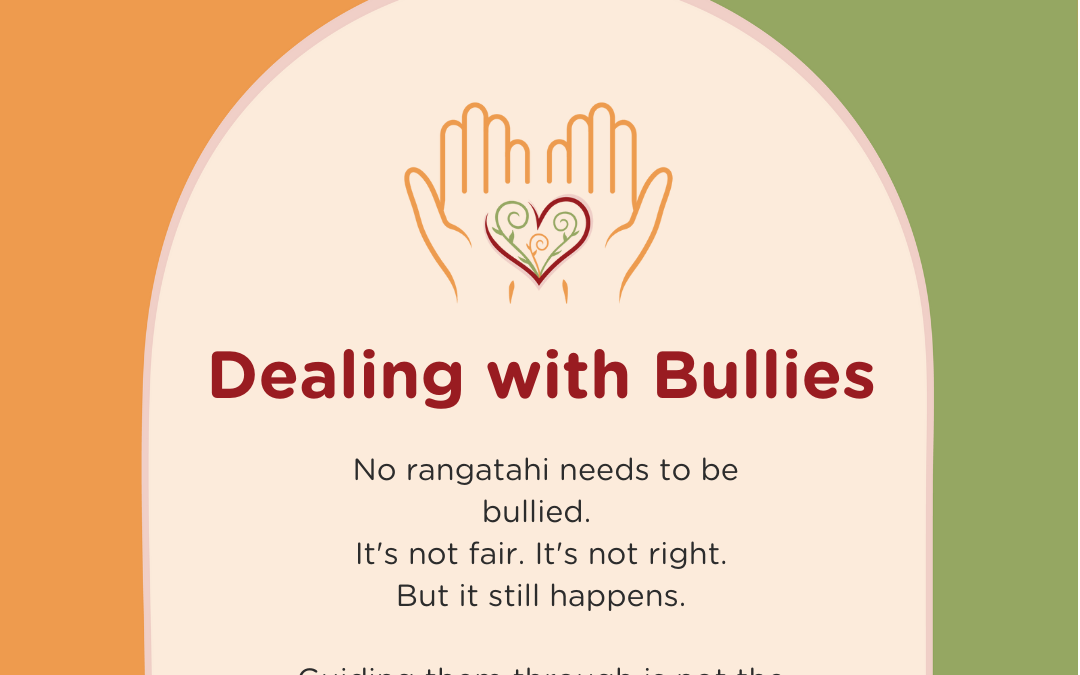It’s fair to say that bullies, and bullying, have changed a bit since our time at school.
Yes, there are still physically threatening people who intimidate others with stand-over tactics. This post is not about those bullies. Should your rangatahi be unfortunate enough to encounter this type of thuggery a trip to the police station is one way to handle that scenario. And if you go through this experience, back your rangatahi 100% of the way. Retelling their tale to strangers will be emotionally exhausting for them and they will need you to be there 100% for them. So, read on …
This post is about what to say, and how to guide your rangatahi through the bullying that is far more prevalent in our rangatahi’s world today – verbal bullying and bullying that occurs through social media.
While we did have mean kids in our day, we got to leave them at school. When the bell rang and we headed off home, we had a rest from these kids. Their taunts and jibes could wait for a while. Not so now. Social media and access to the devices that connect our kids have given bullies the perfect tool to continue with their tactics well after the school bell has rung.
Parents, it’s on us to best support our rangatahi. Schools frequently do not want to be involved in incidents that occur out of hours and hand responsibility for access to devices back to parents when it comes to the bullying that occurs via social media if it happens outside of school hours. Which means us supervising their access.
When you purchase a device for your rangatahi it’s an excellent time to discuss some ground rules, or even draw up a contract, around the use of devices. As proactive as this is, there are still ways around you being able to see everything that happens on their devices – especially as our rangatahi are often one step in front of us when it comes to being able to hide things they don’t want us to see! Social media use often comes down to trust. Check quickly from time and time (without prying) and more frequently if you have a suspicion something is up.
Keep up the open, honest, non-judgmental dialogue with your teen and they’ll be far more likely to confide in you if there are friendship issues they just can’t handle or bullying that’s happening.
As a parent, it can be very hard to remain neutral, especially if they’re upset. Monitoring your own responses is a part of your work. If you are upset by what you’re hearing, it’s ok to show that, however, you also need to be able to share your personal response with another trusted adult away from their hearing. Your rangatahi do not need your emotions in addition to their emotions.
What is important for your rangatahi is you being able to validate how they feel. If they’re upset, reflect that back to them. Tell them simply, “I can see you’re upset. What other feelings are coming up for you?” Then pipe down and let them have their say. Once it’s all out they will be feeling so much better, which will make it so much easier for them to figure a way through it.
Did you catch that last point … it’s so important I’ll repeat it again for you … it’s important for them to figure a way through it.
You can hear their ideas, but let them work out their answers for themselves. Be there to hear them, to guide them and know as you do you can trust them to find their right path. This is great learning for them and to shut down their ideas by telling them what you think they should do is sending them a subtle message that you don’t think they’re capable of sorting things out themselves. If you’ve been the listener they need you to be they may ask your advice, at which point give it to them. Otherwise, zip it.
If you feel you’re in over your head, look for support for yourself. A problem shared is a problem out of your headspace where it’s been draining all your energy just mulling it over. Plus it’s excellent role modeling for your rangatahi on how to ask for help.
You can always reach out for guidance here, a problem out of your head is really a great start.

